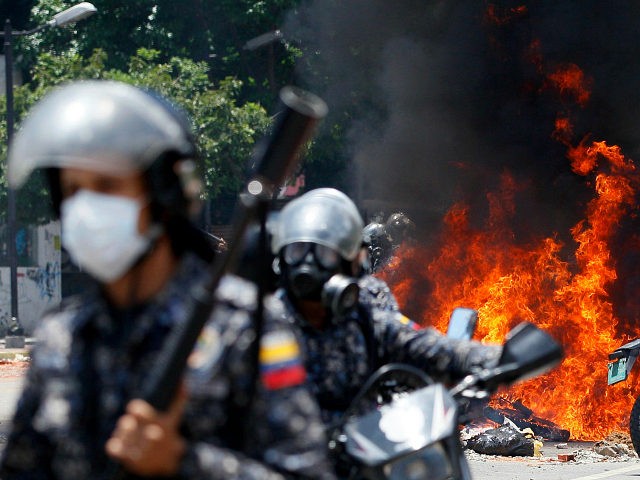The socialist government of Venezuela has declared its election Sunday to create a parallel legislature to rewrite the constitution a popular success, despite reports of low turnout and at least 13 dead in clashes between protesters and the military.
As of press time Sunday night, the state-run Venezuelan network VTV’s top story on its website declared that the election for the “constituents’ assembly,” a fabricated lawmaking body meant to usurp the power of the democratically-elected National Assembly, a success.
The election process, it claimed – citing a military official – “went about in complete normalcy” and peace. The head of the nation’s electoral council, Tibisay Lucena, told media outlets that there were limited violent incidents and high turnout among voters. The opposition, she claimed “are a small part of the country, a few small circles,” and the rest “are calmly voting since the early hours – 99 percent and more have come out to vote.”
Meanwhile, vice president and U.S.-designated drug kingpin Tareck El Aissami claimed that the election was a sign that “peace has triumphed, we can say democracy has triumphed, the people have massively come out to exercise this human right.”
Anti-socialist opposition leaders painted a significantly different picture of the situation on the ground, reporting widespread violence by Venezuelan military against peaceful protesters that has culminated in at least 13 and up to 15 deaths at press time.
The Argentine outlet Infobae places the death count at 15 since late Saturday night, citing opposition leader Henrique Capriles Radonski. Some of the dead have been identified as teens protesting the government – including an unnamed 15-year-old – both in the capital and in the westernmost Táchira region, which border Colombia and has seen some of the greatest violence since dictator Nicolás Maduro took power in 2013. The Venezuelan newspaper El Nacional reports that at least five of the dead were killed in Táchira.
In the Los Andes regime, the Argentine newspaper Clarín reports that three individuals were killed by “paramilitary gangs on motorcycles who shot them in the head.” The Maduro government often relies on motorized chavista gangs known as colectivos to attack peaceful protesters with firearms, as the military typically limits itself to tear gas, rubber bullets, and running over protesters with armored vehicles.
Another notable victim of violence on Sunday was José Félix Pineda, a candidate to the “constituents’ assembly,” shot to death in his home overnight.
Videos also surfaced on social media of National Guard tanks storming known homes of opposition members. In protests in Caracas, images also surfaced of protesters setting tanks on fire.
#30jul Tanqueta del Conas asalta Hotel Imperio frente a Los Verdes de #ElParaíso – vía @AlbertoAltuve pic.twitter.com/0SwBSiEDJF
— @EntreTodosProgresamos (@EntreTodosP) July 30, 2017
As for turnout, this also appeared to yield a far more dismal result for the government than the portrait painted by El Aissami and Lucena. The first sign that turnout had not appeared as expected were government announcements that polls would remain open for up to two hours longer than anticipated.
As one opposition member of the National Assembly noted, “The election commission (CNE) extended the constitutional fraud for another hour. Even keeping them open until tomorrow they would not be able to hide their failure. Stop being so desperate.”
CNE extiende 1 hora más el fraude constituyente.Ni que dejen los centros abiertos hasta mañana logran ocultar el fracaso.Dejen el desespero.
— Tomás Guanipa (@TomasGuanipa) July 30, 2017
Another opposition lawmaker, Delsa Solórzano, told reporters that the opposition estimated that up to 90 percent of eligible voters stayed home and that up to 25 percent of those who went to the polls issued a no-vote, placing a blank ballot in the election boxes to avoid participating substantively in the vote.
Associated Press reporters anecdotally collaborated the report. “Across the capital of more than 2 million people, dozens of polling places were virtually empty, including many that saw hours-long lines of thousands voting to keep the government in power over the last two decades,” the AP noted.
The empty polling stations stood in stark contrast to the long lines of citizens organizing to vote in the opposition’s unofficial election two weeks ago, where 98 percent of the 7.2 million participants voted against having the July 30 vote and replacing the current constitution with one drafted by Maduro allies.
A poll this week found that 72 percent of Venezuelan citizens opposed the government-organized vote Sunday. Despite the overwhelming opposition to the vote, Maduro vowed last Monday that he would not cancel it, and his government followed through this weekend.
The vote was not without flaws even for the most ardent chavistas, however. The government-issued identification cards used to vote, which many fear may be used to tamper with the vote, failed Maduro himself on Sunday, when he attempted to use the card to place a sample vote on television only to have the machine display the message: “This person does not exist or this identification card has been annulled.”
The United States government has rejected the election and called for a restoration of the democratic order. United Nations Ambassador Nikki Haley called Sunday’s vote a “sham” on Twitter and lent support to the democratic opposition.
Maduro’s sham election is another step toward dictatorship. We won't accept an illegit govt. The Venezuelan ppl & democracy will prevail.
— Nikki Haley (@nikkihaley) July 30, 2017
Additionally, CNN cited “two senior administration officials” Sunday who said the Trump administration may soon unveil more sanctions against the Maduro regime.

COMMENTS
Please let us know if you're having issues with commenting.